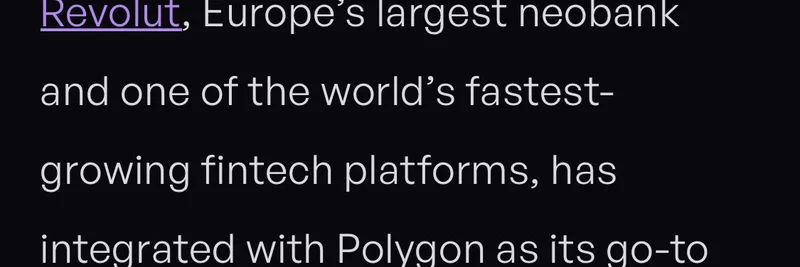In the fast-paced crypto world, where a single tweet can send prices soaring or crashing, narratives aren't just stories—they're weapons. Recently, a post from Vibhu Norby, a manager at the Solana Foundation and founder of projects like Drip Haus, highlighted this with a short tale of "narrative wars" in action. He called out Polygon for a blog post that positioned itself as Revolut's "go-to stack for stablecoin transfers and payments," despite similar features already being live on Solana and other chains.
Revolut, for those new to it, is a major fintech app with millions of users, offering everything from banking to crypto trading. Stablecoins like USDC or USDT are digital dollars pegged to real fiat, making them ideal for quick, low-cost transfers without the volatility of something like Bitcoin.
The controversy kicked off when Degen News, a popular crypto account, shared the news based on Polygon's now-deleted blog. The post claimed Revolut had chosen Polygon for payments, trading, and staking, processing over $690 million in volume. But as Vibhu pointed out, this "go-to" language implied exclusivity, which isn't the case. Revolut supports multiple blockchains, including Solana for stablecoin transfers and more as confirmed in various reports.
Polygon pulled the blog shortly after, but the narrative had already escaped. Articles from outlets like The Block and CoinDesk ran with the story, and even Polygon's own X post remains up, touting the integration without the deleted blog's bold claims.
This isn't just chain rivalry; it's a lesson in how propaganda works in crypto. Once info hits the wires, it's hard to retract. Vibhu noted that syndications and news pieces keep the "false info" circulating, even after deletion.
Replies to the thread added fuel to the fire. One user shared a screenshot of Sandeep Nailwal, Polygon's co-founder, celebrating the integration— a post that's still live.
Another reply poked fun with a book cover meme, "Trust Me, I'm Lying," perfectly capturing the media manipulation vibe in these narrative battles.
Even Solana wasn't spared criticism. A Bitcoin advocate pointed out a similar move by Solana with Cash App's USDC integration, where they emphasized "powered by Solana" despite Cash App's chain-agnostic approach as explained by their product lead.
So, why does this matter for meme tokens? Meme coins like those on Solana (think Pump.fun launches) or Polygon thrive on hype, community, and the underlying chain's reputation. A strong narrative—like being the "go-to" for big fintechs—can attract more users, liquidity, and devs, pumping token prices. But false or exaggerated claims can erode trust, leading to dumps or shifts to rival chains.
For blockchain practitioners, this underscores the need to verify claims. Tools like on-chain data explorers or multi-chain wallets can help cut through the noise. In meme land, where FOMO (fear of missing out) rules, understanding these wars helps you spot real opportunities versus pumped narratives.
Check out the full thread here for more reactions, and stay tuned to Meme Insider for the latest on how tech news shapes the meme token landscape.

